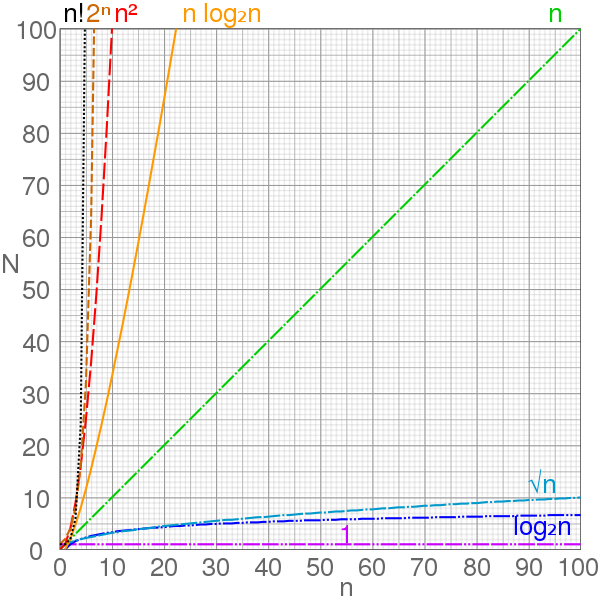Time Complexity
Copyright © 直通硅谷
http://www.zhitongguigu.com/
What is Time Complexity?
- Find a Number from a Array
- If the Array has 10 numbers?
- If the Array has 100 numbers?
- If the Array has 1,000,000 numbers?
- We consider the input n is closing to ∞
Copyright © 直通硅谷
http://www.zhitongguigu.com/


Calculate Prime
Given a number n. Is n a prime?
Copyright © 直通硅谷
http://www.zhitongguigu.com/
A Prime Number can be divided evenly only by 1, or itself.
And it must be a whole number greater than 1.
Input? Output?
2, 3, 5, 7, 11, 13, 17, 19, 23, 29, 31, 37, 41, 43, 47, 53, 59, 61, 67, 71, 73, 79, 83, 89, 97
Calculate Prime
Given a number n. Is n a prime?
Copyright © 直通硅谷
http://www.zhitongguigu.com/
public boolean isPrime(int n) {
// implement you method here
}Calculate Prime
Naive Idea
Copyright © 直通硅谷
http://www.zhitongguigu.com/
public boolean isPrime(int n) {
// Sudo code
int i from 2 -> n-1;
if n mod i == 0
return false
return true
}How many calculations?
n - 2
Calculate Prime
Better Idea
Copyright © 直通硅谷
http://www.zhitongguigu.com/
public boolean isPrime(int n) {
// Sudo code
int i from 2 -> n / 2;
if n mod i == 0
return false
return true
}How many calculations?
n / 2 - 2
Calculate Prime
Even Better
Copyright © 直通硅谷
http://www.zhitongguigu.com/
public boolean isPrime(int n) {
// Sudo code
int i from 2 -> Math.sqrt(n);
if n mod i == 0
return false
return true
}How many calculations?
sqrt(n) - 1
Calculate Prime
Why Square Root Works
Copyright © 直通硅谷
http://www.zhitongguigu.com/
If n = a * b, then n is not a prime
If we cannot find such a (b), then n is a prime
If Math.sqrt(n) = m = 3.316, then a <= m <= b
Do we really care about b?
Conclusion: check from 2 to Math.sqrt(n)
Calculate Prime
Copyright © 直通硅谷
http://www.zhitongguigu.com/
Suppose 1 calculation is 1ms
| input n | (n-2) | sqrt(n) - 1: |
|---|---|---|
| 10 | 8ms | 2ms |
| 10^10 | 10^10ms = 115 days | 10^5ms = 1.66mins |
Calculate Prime
Homework:
Implement the above 2
Copyright © 直通硅谷
http://www.zhitongguigu.com/
Time Complexity
Copyright © 直通硅谷
http://www.zhitongguigu.com/
Big O notation
Time Complexity
Copyright © 直通硅谷
http://www.zhitongguigu.com/
If both and are right, we need to give
Different Time Complexity
- Best Case
- Worst Case
- Average Case
Copyright © 直通硅谷
http://www.zhitongguigu.com/
Best Example: Quick Sort
Different Time Complexity
Copyright © 直通硅谷
http://www.zhitongguigu.com/

Recurrence Equation
- Merge Sort: T(n) = 2T(n/2) + cn
- Binary Search: T(n) = T(n/2) + c
- Selection Sort: T(n) = T(n-1) + cn
- Factorial: T(n) = T(n-1) + c
Copyright © 直通硅谷
http://www.zhitongguigu.com/
Recursive deduction
T(n) = T(n-1) + cn
T(n-1) = T(n-2) + c(n-1)
...
T(1) = T(0) + c
T(0) = 0
Copyright © 直通硅谷
http://www.zhitongguigu.com/
Recursive deduction
T(n) = T(n-1) + cn
T(n-1) = T(n-2) + c(n-1)
...
T(1) = T(0) + c
T(0) = 0
Copyright © 直通硅谷
http://www.zhitongguigu.com/
Master Method
Copyright © 直通硅谷
http://www.zhitongguigu.com/
Master Method
Copyright © 直通硅谷
http://www.zhitongguigu.com/
Master Method
Copyright © 直通硅谷
http://www.zhitongguigu.com/
Example: Binary Search T(n) = T(n/2) + m
a = 1, b = 2, c = 0
It fits the second condition. So T(n) = logn
Recurrence Equation
- Merge Sort: T(n) = 2T(n/2) + cn
- Binary Search: T(n) = T(n/2) + c
- Selection Sort: T(n) = T(n-1) + cn
- Factorial: T(n) = T(n-1) + c
Copyright © 直通硅谷
http://www.zhitongguigu.com/
How to get the recursive equation
- How do you solve the problem?
- How do you divide the problem into smaller part?
- Before going into smaller parts, how many operation do you need?
Copyright © 直通硅谷
http://www.zhitongguigu.com/
Homework
Count Primes
Copyright © 直通硅谷
http://www.zhitongguigu.com/
Count the number of prime numbers less than a non-negative number, n.